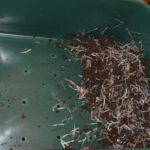17 March 2021 Media Release: District food control measures remain key to ensuring safe food consumption
Media Release: District food control measures remain key to ensuring safe food consumption
For Immediate Release
17 March 2021
Garden Route District Municipality (GRDM) is one of the 44 district municipalities and eight (8) metro municipalities in South Africa who has to monitor all food premises to ensure that food is produced, handled, stored, processed and distributed safely. It is therefore important for Environmental Health Practitioners (EHP) to inspect food premises to assess that food products purchased by customers are safe for human consumption and are of exceptional quality.
In order for GRDM to align itself to the provisions of health related legislation, regular inspections are conducted at all premises where food products are handled and/or stored. These businesses, be it formal or informal, are not limited to hotels, restaurants, spaza shops, dairy farms, butcheries school feeding schemes and retail outlets. While at a premises inspection, EHP check if food products are labelled correctly, hygiene standards are in place, storage is done according to generally accepted standards, food products are handled correctly and also ensure that preventative measures are in place to avoid pest control issues. These inspections are done in accordance with the Regulations governing general hygiene requirements for food premises and the Transport of food; Regulation 638 of 22 June 2018.
The following figures of work outputs for the period January 2017 up to December 2020 are of interest and provide an indication of the number of site visits, which were conducted by GRDM EHPs throughout the region.
- Number of food premises inspections: 42 404
- Number of water samples taken: 7 784
- Food samples taken: 2036
- Health surveillance conducted at premises: 92 436 (these include non-food premises)
The general public can be assured that measures are in place to ensure that safe and healthy food products are provided to all consumers. Furthermore, the public is urged to report any irregularities, complaints or non-compliance to their nearest GRDM Municipal Health office, or to lodge such issues via phone to 044 805 1550 or e-mail info@gardenroute.gov.za.
- Head Office, 54 York Street, George
- GRDM Community Services, Mission Street, George
- Knysna Sub-Office, 24A Queen Street, Knysna
- Mossel Bay Sub-Office, C/O Marlin & Samson street, Extention 23, Mossel Bay
- Plettenberg Bay Sub-Office, 4 Virginia Street, Plettenberg Bay
- Oudtshoorn Sub-Office, 15 Regent Street, Oudtshoorn
- Riversdale Sub-Office, 24 Mitchell Street, Riversdale
All complaints will be attended to and timeous feedback will be provided.
ENDS






























